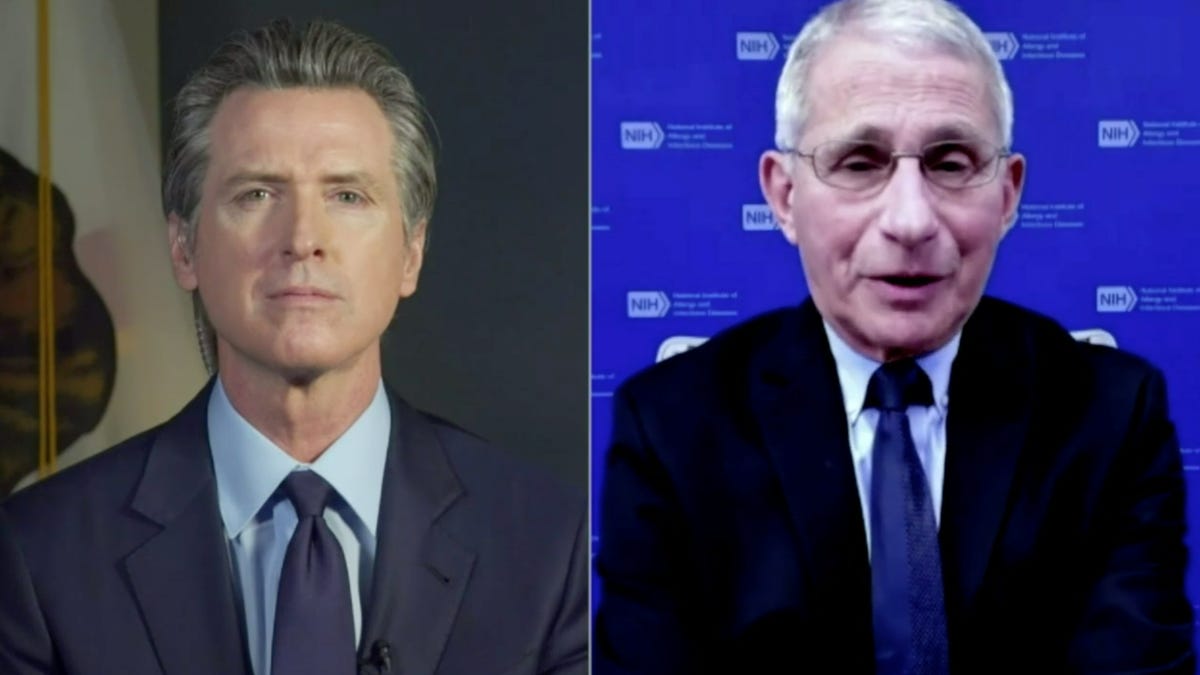COVID-19 vaccine will 'very likely' work on UK mutation, Fauci says, as California reports case
A more contagious variant of the virus, discovered in Britain, has now been detected in California, a day after it first appeared in the US, in Colorado.

Dr. Anthony Fauci, right, discusses the new variant of the coronavirus with California Gov. Gavin Newsom.
The variant of the coronavirus discovered in the UK and said to be more contagious has now appeared in California, the state's governor said Wednesday, a day after the mutation first cropped up in the US, in Colorado.
Speaking with Anthony Fauci in a Facebook Live video, California Gov. Gavin Newsom said one case had been detected Wednesday morning in the southern part of the state. Though the new strain seems to more easily move from one person to another, Fauci, director of the US National Institute of Allergy and Infectious Diseases, said it doesn't appear to be resistant to the vaccines that've been developed.
"It doesn't seem to evade the protection that's afforded by the antibodies that are induced by vaccines," Fauci said. "Even though you have one part of the virus that's changed, it's very likely that the other components of the vaccine-induced response will protect you."
Fauci said, however, that public health officials are keeping a close eye on the mutation, called B.1.1.7. "We're following this extremely carefully," he said. "We have isolates from the UK. We're working on it."
Read more: COVID-19 vaccine facts: Hidden costs, when you can get vaccinated, choosing vaccine brands
The new coronavirus strain was first detected in Britain in September and later prompted the country to go into a strict lockdown during the Christmas break, with various countries, including the US, putting stronger entry requirements in place for travelers arriving from the UK. The variant has also appeared in other countries, including Australia, Canada, France, Spain and Japan.
There's no evidence the variant is any deadlier than previously known strains of the coronavirus or that it makes people any sicker. But a study released last week by a team of UK scientists estimated that it's 56% more contagious, The New York Times reported. The British government had earlier said the variant might be up to 70% more transmissible.
The first US case was found in Colorado on Tuesday, and a second case was discovered in the same state on Wednesday.
The coronavirus is mutating now because there are so many cases, Fauci explained. "RNA viruses, they make a living out of mutating, they love to mutate," he said. "It's replicating a lot, and when you replicate, you mutate."
Fauci said, though, that this variant doesn't evade the tests being used to detect infections in people.
"The other thing they've noted in the UK is that people who have been infected don't seem to get re-infected by this," Fauci added. "Which means the immunity that's given to you [by recovering from the virus] ... is protective against this particular strain."
Read more: Oxford COVID-19 vaccine approved for emergency use in UK

